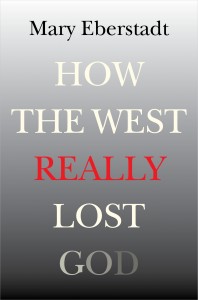 Mary Eberstadt’s new book How The West Really Lost God covers some familiar ground, but with a new twist.
Mary Eberstadt’s new book How The West Really Lost God covers some familiar ground, but with a new twist.
Everyone knows that expressions of faith, any way you measure it, have fallen off throughout Western Europe, and to a lesser extent, in the United States. The great cathedrals of Europe are little more than tourist draws, the parish church, the duomo of Italy, dom of Germany, and dóme of France stand empty and vastly underused. Abbeys and monasteries are converted into condos. Attendance is down, baptisms are down, everything is in free fall.
I saw this firsthand when I toured Italy last summer, although the vibrant parish at Bovolone and the revered churches of Assisi were exceptions.
Everyone also knows that by any measure, the traditional family of married opposite sex parents and biological children, has been on the decline as well. The effects are greater so in Europe than America, but demonstrable both sides of the Atlantic. Fewer people marry, they marry later, fewer have children, they have fewer numbers of children, and they often do not raise those children with their full set of biological parents. Furthermore, almost no one lives with extended family.
Everyone knows this.
But Eberstadt does two things with this presumptive truth: She questions the conventional wisdom to see if it holds up, then she draws some intriguing connections.
What if the decline in faith is not only a cause of but an effect of the decline in family?
Like the chicken and egg, it’s hard to tell what came first. Did people stop having families, at least in the traditional sense, because they stopped believing in the teachings of the church? Or did they stop believing because they don’t experience the community, sacrifice, and transcendence of family life?
Eberstadt makes a good case for both.
Rather, she makes a case that, like a chicken and egg, the two forces are interwoven, existentially connected to one another. Families make churches. Churches make families.
Eberstadt writes from a Catholic vantage, but she rigorously addresses all the questions that a devil’s advocate would raise, up to and including “Why should we care?”
She grounds her arguments in solid social science. In fact, no social science is more firmly established than the benefits to children of being raised by married parents. Almost equally established is the benefit people of faith bring to society, from charitable giving to foster care, to feeding the homeless.
What I liked most, however, is that embedded in all the academic questioning and social science research, Eberstadt allows that people aren’t primarily logical. Secular thinkers can’t adequately explain either the decline of faith or the stubborn persistence of faith because, as Eberstadt posits, “secular modern thinkers have never had an adequate explanation for why people believe in God in the first place.” (pg 213).
We debate a lot about ideas in this country. Is the Bible infallible? Was the world created or evolved? Does sin exist? What behaviors constitute sin and how do you defend that? And so on.
But the thing is, very few are convinced by argument. People may say they are convinced by the logic of atheism or by the apologetics of C.S. Lewis, and no doubt some are, but most of us are brought to faith or away from faith by something more primal. There is a breath across our souls that convinces and logic is only one factor.
Eberstadt rather mystically suggests that the very atmosphere of family breeds transcendence: participating in creation by bringing new life into the world; the awe over a little one’s tiny foot or a young adult’s growth; the knowledge that a parent would sacrifice their life for their child without hesitation; that a spouse continually lays down their own interests for their beloved.
Conversely, more adults live longer alone: A prolonged time between childhood and childbearing, if it happens at all, and an extended solitude after children have left. Could it be that this solitude, this absence from community, makes it easy to avoid the community of the Creator?
This connection is fascinating and I’m glad Mary Eberstadt was sufficiently intrigued to write a book about it. I will certainly ponder these ideas at length.












